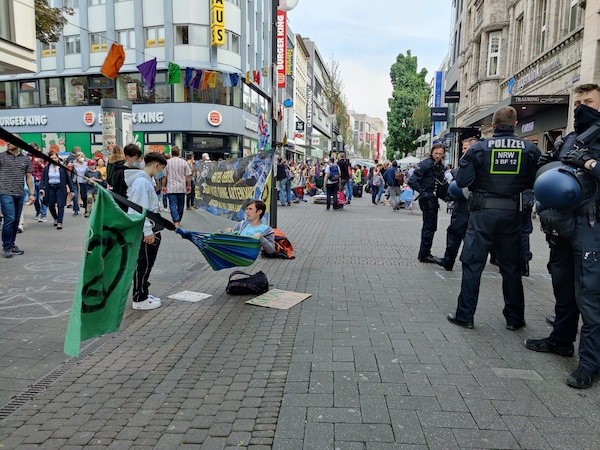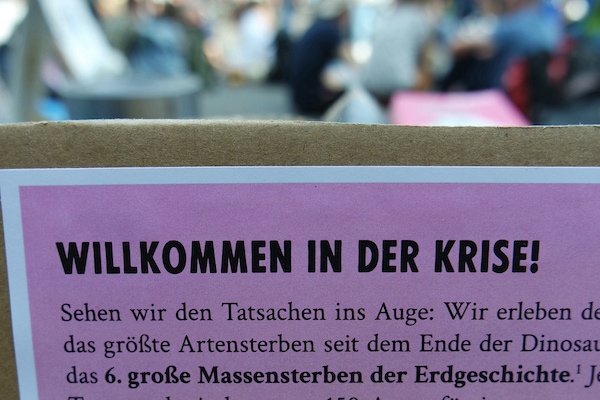Disclaimer: All people mentioned were able to choose how they want to appear in this text. They chose to appear by their clear name and/or activist alias. They were also able to comment on a draft version.
Activist at home anthropology
About seven months into my fieldwork with German activists from the movement Extinction Rebellion Germany, I faced a personal crisis. It was not my first crisis in my young academic career: ethnography is a continuation of overlapping liminal periods of time and space. This crisis, however, will stay with me for longer, which is why I choose to write about it.
I started my PhD in 2021 as a young, white, female anthropologist interested in tackling issues of political importance. Many of my fellow colleagues from anthropology had committed their PhD fieldwork to a place, people, or topic that they had engaged with before. I was instead driven by my understanding of ethical research. I set out to find people that were willing to not only tolerate my presence as an observing bystander but to actively share their doubts and hopes with me, from the conception of my project to its eventual publication, and to address with me the inherent power relations in researching with others (Trundle 2018). For practical and ethical reasons, I chose to conduct anthropology at home (Pulido 2008). Researching in close proximity to my participants allows me to involve them in academic processes beyond fieldwork and enables me to engage with my field as an activist outside of my academic work. Anthropology at home is not yet common in Germany. Upon telling others about my intention to “only” conduct fieldwork in my home country, I was faced with concerned looks. Some felt that I was throwing away my “cultural expertise” from prolonged time spent in Taiwan. Others talked to me about how they felt alienated from the work of their supervising professors when they chose to research at home.
I set out to find people that were willing to actively share their doubts and hopes with me.
For all my life, I have been an active member of civil society. My engagement with issues larger than myself continued at university and in my job at an NGO, writing about the state of human rights in the Philippines. When searching for a field, I knew I wanted to use my time to support something that I believe in. I ended up going to an open meeting of my local group of Extinction Rebellion rebels in Cologne. I vividly remember the strange situation of feeling at home in a place where you have never been before. I was attracted by the emotional diligence with which people interacted with each other. Shortly after, I entered my at-home, activist field. Since then, it has been a constant dance across the fault lines of the strange and the familiar, the here and there, and the close and the distant. As an ethnographer, I am meant to fully submit myself to the experience of living a different life. As a researcher, I am meant to keep an analytical distance. As an activist, I am meant to stand in solidarity with my fellow rebels. As a young woman in academia, I am only meant to be political in ways my discipline sees fit. Like most anthropologists, I constantly occupy conflicting positions.
I was attracted by the emotional diligence with which people interacted with each other.
I turned to conversations and texts to find answers on how to deal with the chaotic positionalities in my personal life, my field, and academia at large. I underwent a voluntary ethical clearance process with the outcome to “watch my distance” for the sake of theoretical analysis and a healthy work-life balance. I read the late David Graeber’s work within the anti-globalization movement (Graeber 2009) and Marianne Maeckelbergh’s perspectives on researching radical movements ethically from within (Maeckelbergh 2016). From their texts, I took away the continuous need to reflect on my shifting positionalities and to live and research by the understanding of ethics within my field.
Like most anthropologists, I constantly occupy conflicting positions.

© Extinction Rebellion NRW Media Team

© Extinction Rebellion NRW Media Team
At first, I was interested in how different groups of rebels interacted with each other inside the decentral movement, how information travelled, and how consensus decisions were reached. Extinction Rebellion is a movement that aims to reflect on its actions in cycles of mediation and learning. There, I felt like I could put my often-so-abstract ethnographic observations into practice. Over time, I understood that my form of collaboration is based on the solidarity with the struggles me and my fellow rebels find ourselves in. Many voices in anthropology are critical towards “going native” in the field for they fear the lack of distance and objectivity in constructing scientific knowledge. I had already started my fieldwork as a “native”, sharing core values with my participants, but also with a fresh perspective on a movement that I had not been a part of before my fieldwork. Since then, I learned that “going native” is a process of deep relationality and offers a new set of possibilities and precautions to participant observation. My knowledge production in the field is influenced by relations beyond my academic work in which I am often no longer recognizable as an ethnographer. It requires an alertness to the responsibilities this form of closeness brings when writing about others.
Spirituality as political (research) practice in Germany
After six months in the field, I took part in a training on the roots of the movement. Linda and Michael were freshly trained DNA trainers and explained the origins of the ideas Extinction Rebellion was built on in the UK. When Extinction Rebellion came to Germany in late 2018, the movement was heavily influenced by groups from the political left. Just now, several collectives and measures are emerging within the movement that aim to “reincorporate” the DNA into a political activism that mostly relates to everyday political events. DNA, essentially who we are as a movement, is a highly contested term within my field. It connects to Extinction Rebellion’s list of principles and values that structure the movement’s everyday organization and political actions as guidelines on how to engage with each other as a community (Extinction Rebellion UK 2022). These principles simultaneously show the ambition of the movement to challenge individual and collective values in society (remark by Michael, 26.05.2022). Linda and Michael guided our group through different exercises. They spoke of the American Civil Rights Movement in the 1950s, of Mahatma Gandhi’s salt march, and of other thinkers from Buddhism, Hinduism, and natural philosophy such as Joanna Macy as inspirations for the movement. In short exercises, we reflected on where we see the principles in our own movement contexts, and how to further implement strategies of communication and practice to enhance the presence of our DNA among us.
My perspective onto the movement of which I had been a part of for several months shifted. These eclectic, spiritual roots had then been rarely talked about. Still, I felt like I had been feeling and practicing them for longer. I started to look through my field diary. I wrote about feeling alienated by the openly lived emotional force of my fellow rebels, when people shared their feelings around environmental catastrophes which they had heard about on the news. Now, I know that interpersonal practices of care in the form of speaking and listening are central to the activist’s understanding of political practice. I wrote about sensing connection to others in our everyday rituals of “checking in” before our meetings, where people share their state of being and reflect on our ways of working together. Now, this speaks to our crafting of a common vision of change across generations and backgrounds, and on the importance of (un)learning.
What I had so far only understood as “affect”, a common concept to approach research on activism, was also part of a German political spirituality, a highly debated contestation of how the rebels, as part of a German society, relate to one another and what values they see as important for living a political life. I was hesitant. It was already difficult to explain that my mode of doing research was both at home and activist. Although spirituality is a classical topic in anthropology, spirituality as a mode of doing research and a way of knowing one’s field is only slowly gaining recognition in anthropological debates (Palmer 2021). Many German anthropologists and activists alike view the practice of spirituality as opposite to the professional and the political – they view it as hyper-personal and separated from rational thought.
What I had so far only understood as “affect” was also part of a German political spirituality.

© Extinction Rebellion NRW Media Team
She paused and then told me to write for a future generation of activists.
We sat together on a Sunday evening in my small apartment in Cologne, shortly after my DNA training, and drank a bottle of wine that I had gotten to celebrate Inti’s 40th birthday. I didn’t take any notes that evening and am now recounting from memory. I told Inti about my newly found fascination with the underlying spiritual nature of the movement and its troubles to implement these roots in Germany. I considered to change my research focus to the practice of this eclectic, political spirituality that underpins Extinction Rebellion’s actions, but I was hesitant because I wondered if it would be helpful to the movement in any way. She asked me if the people I research with wanted me to write something helpful. I awkwardly reminded her that she was also one of those people. She paused and then told me to write for a future generation of activists. To write on a topic that the generations to come will have to deal with.
A Crisis of Categorization
My personal crisis is a crisis of knowing through ways that are not seen as “academic” or “activist” in Germany; of knowing through ways, which both, my fellow rebels and I lack words to describe, only to resort to the loaded term of “spirituality” as anything non-material. Anthropology has long been perceptive to the crisis of categorization, of how to work around the ethnographic feeling when nothing fits what you have known before. Categorization entails an intrinsic violence that is at the centre of how we read, teach, research, and write within the discipline. We think extensively about how to talk about the people we research with, to not forcefully push other people’s lives into tight academic concepts. We practice closeness to feel categorization alongside those we study. Then we distance ourselves from our fields to analyse its embeddedness. Knowledge based on fieldwork does not fit into neat categories and therefore we understand the struggles of our participants that are themselves trying to make sense of messy lives within unseen but often felt structures of power. Within Extinction Rebellion Germany, these structures of power are, to me, the processes of marginalization of ideas and practices that are not easily recognizable as “political”. Within anthropology, these structures of power are sustaining perceptions of knowing through distance and materiality, aiming to make ethnographic fieldwork a more tangible practice.
The freedom to cultivate situated rebellious and utopian practices and ways of thinking is needed to make another world possible.
In her 2021 essay “The reluctant native”, Yasmeen Arif makes the case for an epistemic disobedience in anthropological research. She claims that as researchers, our positionality is perceived through our names and modes of fieldwork, described and evaluated in our texts and bibliographies. If we call ourselves a political anthropologist, an activist scholar, a “native” anthropologist, we are expected to follow certain themes of work, certain texts, certain arguments. I argue from her text that if we hand the intrinsic compassion of an epistemic freedom to our participants and simply get to know life alongside them, we should also extend it to our fellow thinkers and writers and to ourselves. Epistemic freedom entails, so Arif, an emancipation of terminology, of ways of doing things and making sense of things, and of the freedom and right to be who we are and speak from our own vantage points, without being told what is right or wrong, political or unpolitical, rational or spiritual. The freedom to cultivate situated rebellious and utopian practices and ways of thinking is needed to make another world possible. It will for sure be something that generations of activists and anthropologists to come will have to deal with.
Bibliography
Arif, Y. (2021) The Reluctant Native Or, Decolonial Ontologies and Epistemic Disobedience. HAU: Journal of Ethnographic Theory. 11, 1, 256-263.
Graeber, D. (2009) Direct Action: An Ethnography. Edinburgh, AK Press.
Extinction Rebellion UK (2022) About Us. Available from: https://extinctionrebellion.uk/the-truth/about-us/ [Accessed 13th of May].
Maeckelbergh, M. (2016) Whose Ethics? Negotiating Ethics and Responsibility in the Field. In: Alexandrakis, O. (ed.) (2016) Impulse to Act: A New Anthropology of Resistance and Social Justice. Bloomington, Indianapolis, Indiana University Press, 211-30.
Palmer, D. (2021) Spirituality as Method in Anthropology and Sociology. Available from: https://medium.com/the-new-mindscape/spirituality-as-method-in-anthropology-and-sociology-faf883faca27 [Accessed 13th of May 2022].
Pulido, L. (2008) FAQs: Frequently (Un)Asked Questions about Being a Scholar Activist. In: Hale, C.R. (Hg.) Engaging Contradictions: Theory, Politics and Methods of Activist Scholarship. Berkeley, University of California Press, 341-66.
Trundle, C. (2018) Uncomfortable Collaborations: The Ethics of Complicity, Collusion, and Detachment in Ethnographic Fieldwork. Collaborative Anthropologies. 11, 1, 89-110.
Featured image © Extinction Rebellion NRW Media Team.




